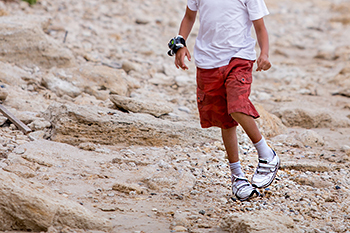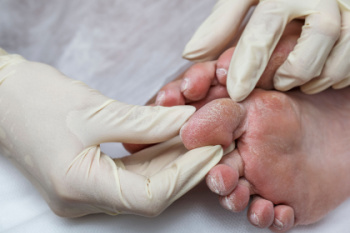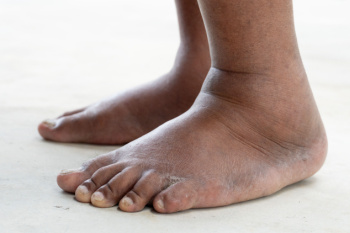Connect With Us
Blog
Items filtered by date: June 2025
Ankle Fracture? Don’t Wait for Treatment
Understanding Congenital Foot Deformities in Children

Congenital foot deformities are conditions present at birth that affect the structure and alignment of a child's feet. Metatarsus adductus involves inward bending of the front part of the foot. Clubfoot causes the foot to turn inward and downward. Calcaneovalgus results in an upward and outward positioning of the foot, while congenital vertical talus creates a rigid flatfoot with the sole facing outward. These deformities can impact walking, balance, and comfort, if not treated early. A podiatrist can diagnose these conditions through physical examination and imaging, then develop a treatment plan that may include stretching, casting, bracing, or surgical correction. If you notice unusual positioning or movement in your child's feet, it is strongly suggested that you promptly consult a podiatrist to ensure early intervention and healthy development.
Congenital foot problems require immediate attention to avoid future complications. If you have any concerns, contact Larry Slomowitz, DPM of California. Our doctor can provide the care you need to keep you pain-free and on your feet.
Congenital foot problems are deformities affecting the feet, toes, and/or ankles that children are born with. Some of these conditions have a genetic cause while others just happen. Some specific foot ailments that children may be born with include clubfeet, polydactyly/macrodactyly, and cleft foot. There are several other foot anomalies that can occur congenitally. What all of these conditions have in common is that a child may experience difficulty walking or performing everyday activities, as well as trouble finding footwear that fits their foot deformity. Some of these conditions are more serious than others. Consulting with a podiatrist as early as possible will help in properly diagnosing a child’s foot condition while getting the necessary treatment underway.
What are Causes of Congenital Foot Problem?
A congenital foot problem is one that happens to a child at birth. These conditions can be caused by a genetic predisposition, developmental or positional abnormalities during gestation, or with no known cause.
What are Symptoms of Congenital Foot Problems?
Symptoms vary by the congenital condition. Symptoms may consist of the following:
- Clubfoot, where tendons are shortened, bones are shaped differently, and the Achilles tendon is tight, causing the foot to point in and down. It is also possible for the soles of the feet to face each other.
- Polydactyly, which usually consists of a nubbin or small lump of tissue without a bone, a toe that is partially formed but has no joints, or an extra toe.
- Vertical talus, where the talus bone forms in the wrong position causing other bones in the foot to line up improperly, the front of the foot to point up, and the bottom of the foot to stiffen, with no arch, and to curve out.
- Tarsal coalition, when there is an abnormal connection of two or more bones in the foot leading to severe, rigid flatfoot.
- Cleft foot, where there are missing toes, a V-shaped cleft, and other anatomical differences.
- Macrodactyly, when the toes are abnormally large due to overgrowth of the underlying bone or soft tissue.
Treatment and Prevention
While there is nothing one can do to prevent congenital foot problems, raising awareness and receiving neonatal screenings are important. Early detection by taking your child to a podiatrist leads to the best outcome possible.
If you have any questions, please feel free to contact our office located in Westlake Village, CA . We offer the newest diagnostic and treatment technologies for all your foot care needs.
Limb Salvage in Diabetic Foot Care and Making the Decision

Deciding on limb salvage in diabetic foot cases involves evaluating several serious factors. A life threatening infection that does not respond to treatment may require urgent attention. Severe deformities that cannot be corrected and prevent proper function or healing also influence the decision. Additionally, if blood flow to the foot cannot be restored, tissue may not survive, making salvage unlikely. A podiatrist plays a vital role by assessing the severity of infection, circulation, and structural changes. They collaborate with other specialists to explore all possible treatments before considering limb loss. If you or a loved one is facing complex diabetic foot issues, it is suggested that you are under the care of a podiatrist to discuss options and develop the best possible care plan.
Diabetic Limb Salvage
Diabetic limb salvage can be an effective way in preventing the need for limb amputation. If you have a foot ulcer and diabetes, consult with Larry Slomowitz, DPM from California. Our doctor will assess your condition and provide you with quality foot and ankle treatment.
What Is Diabetic Limb Salvage?
Diabetic limb salvage is the attempt of saving a limb, such as the foot, that has an infected ulcer, from amputation. Podiatrists also try to make sure that there is enough function in the foot after the salvage that it is still usable. Those with diabetes experience poor blood circulation, which prevents proper healing of an ulcer. If the ulcer is left uncheck, it could become infected, which could result in the need for amputation.
Diabetes is the number one cause of non-traumatic amputations in the United States. Amputation has been found to lead to higher mortality rates. This translates into higher healthcare costs, and a reduced quality of life and mobility for amputees. Podiatrists have attempted to increase the prevalence of limb salvage in an attempt to solve these issues.
Diagnosis and Treatment
Limb salvage teams have grown in recent years that utilize a number of different treatments to save the infected limb. This includes podiatrists that specialize in wound care, rehabilitation, orthotics, and surgery. Through a combination of these methods, limb salvage has been found to be an effective treatment for infected limbs, and as an alternative to amputation. Podiatrists will first evaluate the potential for limb salvage and determine if the limb can be saved or must be amputated.
If you have any questions, please feel free to contact our office located in Westlake Village, CA . We offer the newest diagnostic and treatment technologies for all your foot care needs.
Swollen Feet During Pregnancy Is Common

Swollen feet are a common concern during pregnancy, usually caused by increased fluid retention and pressure on blood vessels from the growing uterus , which slows circulation. Hormonal changes can also affect blood flow and contribute to swelling. Risk factors include standing for long periods of time, hot weather, poor circulation, and excessive weight gain. Symptoms include puffiness in the feet and ankles, a heavy sensation, and discomfort when walking. While swelling is usually harmless, it can interfere with daily activities. A podiatrist can evaluate foot health, recommend supportive footwear, suggest gentle exercises, and offer treatment to improve circulation. If your feet have become swollen during your pregnancy, it is suggested that you consult a podiatrist who can offer you effective relief tips.
Swollen feet can be a sign of an underlying condition. If you have any concerns, contact Larry Slomowitz, DPM of California. Our doctor can provide the care you need to keep you pain-free and on your feet.
Swollen feet are a common ailment among pregnant women and people who stand or sit for extended periods. Aging may increase the possibility of swollen feet and patients who are obese often notice when their feet are swelling too. There may be medical reasons why swollen feet occur:
- Phlebitis - A condition that causes the veins to become inflamed and can also cause leg pain.
- Liver disease - This may lead to low blood levels of albumin which is a protein. This can cause fluid in the blood to pass into the tissues and several areas of the body can become swollen.
- Heart failure - When the heart doesn’t pump properly the blood that is normally pumped back to the heart can pool in the veins of the legs causing swollen feet.
- Kidney disease - One of the main functions of the kidneys is releasing excess fluid in the body. This type of condition can make it difficult for the kidneys to function properly, and as a result the feet may become swollen.
- Deep-vein thrombosis (DVT)- This is a serious condition where blood clots form in the veins of the legs. They can block the return of blood from the legs to the heart which may cause the feet to swell. It is important to be treated by a podiatrist if this condition is present.
Swollen feet can also be caused by bone and tendon conditions, including fractures, arthritis, and tendinitis. Additionally, there may be skin and toenail conditions and an infection may cause the feet to swell. Patients who take medicine to treat high blood pressure may be prone to getting swollen feet.
Many patients elevate their feet to help relieve the swelling and this is generally a temporary remedy. When a podiatrist is consulted the reason behind the swelling can be uncovered and subsequently treated.
If you have any questions please contact our office located in Westlake Village, CA . We offer the newest diagnostic and treatment technologies for all your foot and ankle needs.
Identifying Underlying Causes of Limping

Limping due to foot or ankle pain is often caused by an antalgic gait, which is the body’s response to discomfort in the lower limbs. This type of limp, termed antalgic gait, is usually a sign that a person is shifting weight away from a painful area, resulting in uneven walking patterns. Common causes of limping include fractures, arthritis, inflammation, or infection in the bones or joints of the feet. Rheumatoid arthritis can damage joints in the toes and ankles, while osteoarthritis may lead to pain from worn cartilage. In some cases, tumors or infections in the bones of the foot can lead to persistent limping. Sciatica and spine conditions may also trigger foot pain that affects walking. Diagnosis typically involves imaging tests to locate inflammation, fractures, or bone damage. A podiatrist may recommend supportive footwear, custom orthotics, medication, or surgery, depending on the severity of the condition. If you are limping, it is suggested that you schedule an appointment with a podiatrist for a diagnosis and appropriate treatment.
If you have any concerns about your feet, contact Larry Slomowitz, DPM from California. Our doctor can provide the care you need to keep you pain-free and on your feet.
Biomechanics in Podiatry
Podiatric biomechanics is a particular sector of specialty podiatry with licensed practitioners who are trained to diagnose and treat conditions affecting the foot, ankle and lower leg. Biomechanics deals with the forces that act against the body, causing an interference with the biological structures. It focuses on the movement of the ankle, the foot and the forces that interact with them.
A History of Biomechanics
- Biomechanics dates back to the BC era in Egypt where evidence of professional foot care has been recorded.
- In 1974, biomechanics gained a higher profile from the studies of Merton Root, who claimed that by changing or controlling the forces between the ankle and the foot, corrections or conditions could be implemented to gain strength and coordination in the area.
Modern technological improvements are based on past theories and therapeutic processes that provide a better understanding of podiatric concepts for biomechanics. Computers can provide accurate information about the forces and patterns of the feet and lower legs.
Understanding biomechanics of the feet can help improve and eliminate pain, stopping further stress to the foot.
If you have any questions please feel free to contact our office located in Westlake Village, CA . We offer the newest diagnostic and treatment technologies for all your foot and ankle needs.

